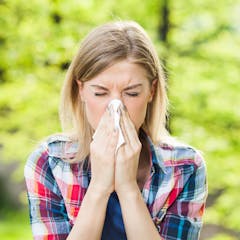
Articles on Colds
Displaying 1 - 20 of 31 articles

Grandma swore by it. Now science weighs in on the healing powers of chicken soup.

The answer might surprise you.

Despite an abundance of research on strep, there is still a great deal of debate in the scientific community over whether and when people should get tested and treated for it.

Children aged under six years shouldn’t have cough syrup. It’s not only ineffective, it can be harmful.

Knowing if you have COVID or the flu can affect when you get vaccinated, need a particular antiviral, or if you need to work from home. But these combination tests can be expensive.

Here are some simple things you can do everyday to help your immune system fight off infections.

There are many things you can do to help your pet when they’re sick.

Decades of research show that respiratory illnesses are dramatically reduced when people wear face masks.

Problems arise when there are too many unwarranted visits to GPs for cold symptoms. Occasionally, though, a cold might turn into something that needs specific diagnosis and treatment.

Some viruses even tend to be more common in the summer than in the winter.

Some lozenges are more effective than others at soothing a sore throat.

In some cases, fever reducers and extra fluid intake can weaken the body’s response to infection.

Going out in the cold won’t necessarily lead to you getting a cold. But cold weather in general is more hospitable to viruses, so it’s wise to take steps to keep your immune system strong.

Although it can sometimes be challenging, there are ways to distinguish respiratory symptoms caused by a virus and those caused by an allergy.

It’s much more likely your child’s symptoms are caused by a common respiratory virus than COVID-19. But it’s important to follow testing guidelines and keep them home if they’re unwell.

Leaving your coat at home on a cold winter day doesn’t automatically mean you’re going to get sick. But it could make you more susceptible to germs.

Dry, moist, productive, hacking, chesty, whooping, barking, throaty. Which type of cough do you have and why?

Illness often strikes when you’re stressed at work, not sleeping properly, or you’ve been out partying a little too much. Here’s why.

From vitamin C to chicken soup, there are many supposed remedies for treating a cold. Here’s what the evidence says.

Most adults get two to three colds per year, while the flu is less common but more severe. Here’s how to stop spreading them to others.
